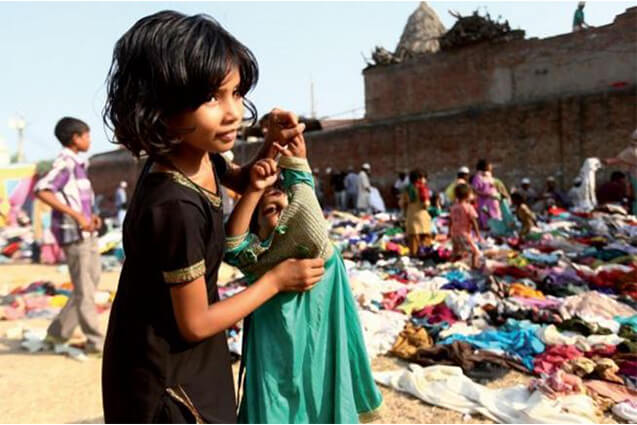With political mudslinging taking the centre stage even after the violence in muzaffarnagar and adjoining areas has calmed down, atleast on the surface, a look at one of the camps, Malakpur relief camp, reminds us of how disastrous a riot can be for thousands of innocent poor affected.
More than a month after violence broke out in Muzaffarnagar and adjoining districts, the survivors of the riots continue to live in camps, under sub-humane conditions, too scared to return to villages, they once referred to as their homes.
As we visited the Malakpur relief camp we saw rows of plastic tents providing an unconvincing shelter to the thousands who have been displaced. About 10,000 Muslims afftected by the riots are living in this particular relief camp in conditions which all indicate a severe humanitarian crisis. The Jamat e Ulema-i-Hind is running the Malakpur relief camp. The Camp has 1508 plastic tents, each hosting a family.
Because of the huge number, the entire relief camp has been divided into 6 wards, which to a common person are difficult to decipher. Each ward is looked after a team of ten volunteers of the Jamiat who look after their basic needs. Though food grains and raw materials are provided to each family, which cooks its own food the conditions in which these 10,000 people live are beyond humane. We saw a big hole dug right in the middle of the relief camp, which is literally under the sun, used as a toilet. Women would either go to the adjoining jungle or would have to manage to use a makeshift four walled tent as one.
For numbers as large as 10,000 at Malakpur, all of whom belonged to the minority Muslim community, we did not see one police van, no government health facility neither any supplies from the administration. The people there have lost trust in the police etc whom they claim were silent spectators and did not come out to help when they were desperately needed. For the first three weeks, we were told, they were sent 400 liters of milk every day. 400 liters for 10,000 and more! The unbearable heat, the stench of defecation all around, flies, pregnant women and infants as young as 7 days not well looked after, all marked the malakpur relief camp. The adjoining jungle also posed threats to the safety of the inhabitants, who have even had to face snakes etc at night.
Women and children have been the worst sufferers in this human tragedy. The camps are a ghastly sight when one sees new born children, lying close to their mothers in plastic tents under the sun, with flies all over them. There is dirt, filth, human excreta everywhere specially in the Malakpur camp where there is a huge population. They have constructed a few makeshift toilets and a few hand pumps. Lack of proper toilets pose a serious threat to the safety of women and young girls specially during the nights. Pregnant women and those having their menstrual cycle are very vulnerable to diseases. Women were angry for being subjected to this pitiable plight and being reduced to living in camps. Quite a few women said that though they were poor they were happy to be living in their homes and were extremely traumatized living like refugees in camps. But they were also categorical that they cannot return to their villages.
There have been many cases of mass assault and rape although understandably very few survivors are willing to share the ghastly experience. We were told about this in both the camps by different women. They also told us that some mothers had mustered the courage and shared stories of how their daughters were raped and then burnt alive. They said that FIRs have been filed by some but they are still awaiting investigation.
Children in the camps are traumatised. There are some who did not eat for five days when they arrived because of the trauma they were in. Children and their psyche has been greatly affected by the violence.
These riots depict a clear failure of the administrative machinery. It is a desperate need that relief reaches those most in need and the government needs to play a more proactive role in the same. Though some camps in Muzaffarnagar and Shamli districts have been provided with food and compensation for the deceased, many like Malakpur have yet to receive help of any kind. There are claims of relief and money flowing in from different quarters, but the living conditions in the camps are a clear indicator of nothing reaching the survivors.
 Author: Mariya Salim
Author: Mariya Salim




